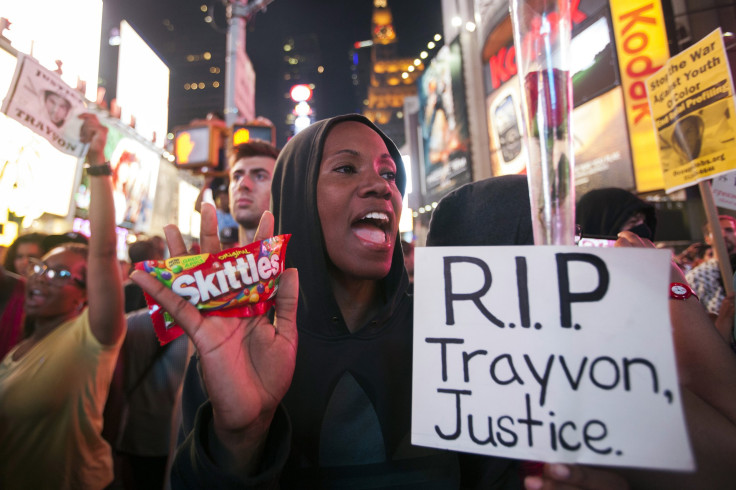Trayvon Martin’s Death And Skittles: A Peculiar Marketing Dilemma

One of the most iconic artifacts of the Trayvon Martin-George Zimmerman murder saga is Skittles, the candy that Martin had in his possession when he was shot to death by Zimmerman in a gated community in Sanford, Fla., last February. In scores of protest demonstrations across the country since the killing and the recent "not guilty" verdict, many people have held up Skittles bags, often along with cans of Arizona Iced Tea, while sporting "hoodie" jackets (all of which are also associated with the killed black teen).
But it is Skittles, which are made by confectionery giant Wrigley Company, a subsidiary of Mars Inc., that has gained the greatest prominence in symbolizing the innocence of Martin, who was only 17 when he was killed. Now, in the wake of Zimmerman’s acquittal of murder charges, Skittles may have become a symbol of the tragedy of lost youth and a life cut short. Skittles remain one of the most prominent artifacts carried by protesters demanding that Martin get justice through a renewed prosecution of Zimmerman by the Justice Department.
Skittles appear in makeshift memorials to Martin, have been used to raised funds for the Martin family’s legal defense and have been been sent to the Sanford police chief. According to a report in the Guardian, Wrigley has “wisely” kept quiet about a phenomenon that has likely become a financial boon for them. Last March, just one month after the fatal encounter between Martin and Zimmerman, the New York Times reported that the colorful candy's association with the racially charged murder created a spike in sales and thereby became a kind of a peculiar and unprecedented “marketing crisis” for Wrigley and its Virginia-based parent.
“You get trained if someone dies eating your product, but I don’t think anyone has been through training for something like this,” said Beth Gallant, a marketing professor at Lehigh University. Wrigley tried to deal with the delicate situation last year by tepidly saying in a corporate press release that it seeks to respect the privacy of the Martin family and that it would be “inappropriate to get involved or comment further as we would never wish for our actions to be perceived as an attempt at commercial gain following this tragedy.”
Even before the killing of Trayvon Martin, the Times noted, Skittles were wildly popular among U.S. children and teenagers, second only to Starburst in overall sales among chewable candies. According to Bloomberg-BusinessWeek, Skittles are the 14th-most-popular candy in the U.S., generating annual sales of $150 million. (The top candy is the iconic M&Ms, also manufactured by Mars, which racks up annual sales of $673 million.)
But the death of Martin (as long as he remains a dominant subject in the news media) seems to be permanently linked to his favorite candy. Some activists have said that since Wrigley is profiting hugely from the tragedy, the corporation should donate money to the Martin family’s defense fund or invest in deprived communities. Others suggested boycotting Wrigley products in order to stop the tide of unintended prosperity. “I think we are at a dangerous position where we can make Wrigley richer,” said Rashad Moore, president of the chapel assistants at Morehouse College, a historically black college in Georgia.
Weldon McWilliams, a professor of African-American studies at Cheyney University of Pennsylvania, told the Times: “I completely understand the symbolism, but let’s re-examine what we’re doing. Will Wrigley’s reinvest that rise in profit that they see? I’m highly skeptical of that.” But at least one expert opined that Wrigley is handling the situation perfectly. “Wrigley’s is playing it exactly as I expect they would — they make a quiet statement and just sit back and let this thing unfold,” said Amy Stern, vice president of Bender Hammerling Group. “The fact is, this is bringing their brand name to the forefront. It’s becoming its own social media campaign, and that’s a windfall for the company. But you have to step carefully. This could backfire.”
© Copyright IBTimes 2024. All rights reserved.



















